Ring Symphony Wagner’s

Usher Hall, Edinburgh Fri 16 May 2025 7.30pm
Glasgow Royal Concert Hall Sat 17 May 7.30pm
Dedicated to Dr Robert Lillie in recognition of his generous support of the RSNO Foundation



Usher Hall, Edinburgh Fri 16 May 2025 7.30pm
Glasgow Royal Concert Hall Sat 17 May 7.30pm
Dedicated to Dr Robert Lillie in recognition of his generous support of the RSNO Foundation

Usher Hall, Edinburgh Fri 16 May 2025 7.30pm
Glasgow Royal Concert Hall Sat 17 May 7.30pm
Wagner’s Ring cycle is an epic in every sense. The full experience takes four days, but this evening’s orchestral ‘adventure’ gives you a taste of the masterpiece – all its majesty, power and drama – in just over an hour. First, though, we welcome our Partnership Ensemble, Dunedin Consort, for Handel’s enchanting Water Music before the Consort’s period instruments lock horns with the full RSNO, in a world premiere from Edinburgh composer Neil Tòmas Smith.
HANDEL Water Music Suite No3 HWV 350 [11’]
NEIL TÒMAS SMITH Hidden Polyphony [20’] WORLD PREMIERE (RSNO and Dunedin Consort commission)
WAGNER arr. HENK DE VLIEGER The Ring, An Orchestral Adventure [62’]
Thomas Søndergård Conductor
Anna Dennis Soprano
Dunedin Consort
Royal Scottish National Orchestra
Dedicated to Dr Robert Lillie in recognition of his generous support of the RSNO Foundation
The Glasgow performance will be recorded for the RSNO Archive. Supported by the Iain and Pamela Sinclair Legacy.
If viewing these notes at the concert, please do so considerately and not during performances. Please silence all mobile telephones and alerts, and refrain from taking photographs, without flash, until the end of each piece.
DND Thu 29 May 7.30pm
EDN Fri 30 May 7.30pm
GLW Sat 31 May 7.30pm

Debussy Prélude à l’après-midi d’un faune (Dundee and Edinburgh only)
Price Adoration and Wirén Serenade for Strings (Glasgow only) † Mendelssohn Violin Concerto Lera Auerbach Symphony No1 Chimera
Thomas Søndergård Conductor
Kellen Gray Conductor † Randall Goosby Violin
Musicians from Glasgow Instrumental Music Services †


Welcome to this evening’s concert, which is dedicated to the memory of Dr Robert Lillie in recognition of his generous support of the RSNO Foundation. It’s a particularly special one tonight as we are joined by Dunedin Consort for the culmination of our three-year partnership. We are celebrating the success of this partnership with a World Premiere, written by Neil Tòmas Smith especially for the occasion.
Neil’s work, Hidden Polyphony, was chosen after an open call for composers in 2023. I thoroughly recommend you spend some time reading about Neil’s inspiration for the piece further on in this programme – it’s absolutely fascinating. Neil was part of our Composers Hub a few years ago and it’s a real testament to the importance of our Learning and Engagement Department’s work that we get to hear his brand-new work performed by these world-class ensembles. It’s a privilege to be able to give a platform to emerging composers such as Neil and I’m looking forward to seeing where the future takes him.
I’m certain you’ll be impressed by Anna Dennis’ voice too, and I’m pleased she’ll be back with us next Season performing a new commission by Elena Langer under the direction of Kristiina Poska. General ticket sales for the 2025:26 Concert Season opened on Monday, so make sure you secure your chance to hear Anna at rsno.org.uk.
The Orchestra is heading out and about next week for matinee performances in Ayr and Lanark. Ayr is getting a second visit too, with the RSNO Chorus performing on Saturday afternoon in Holy Trinity Church to fundraise for their upcoming tour to Budapest. It would be lovely to see some of you there.
Alistair Mackie CHIEF EXECUTIVE








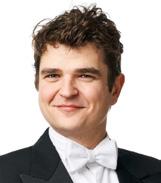
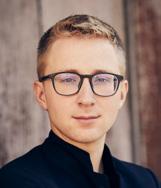



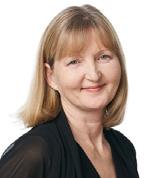





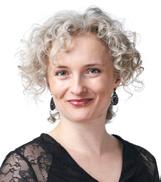






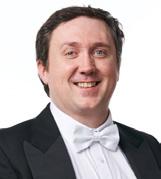
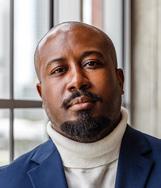
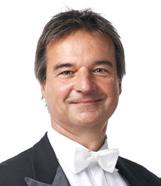















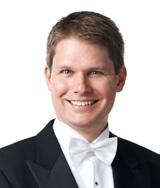


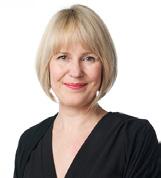
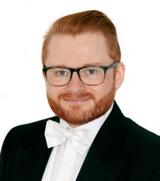









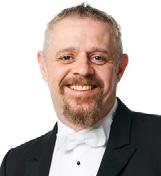






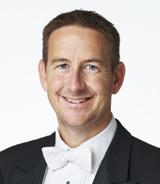
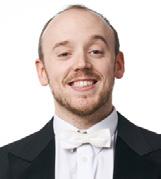











Thomas
VIOLA
Tom Dunn PRINCIPAL
Jacqueline
Robin
Emily Nenniger
Kirstin

DURATION 11 minutes
Sarabande
Rigaudon I – Rigaudon II
Minuet I – Minuet II
Gigue I – Gigue II
Performed by Dunedin Consort
The historical background to Handel’s Water Music – how it came to be composed and when it was first performed – remains imprecise. According to popular legend, Handel had obtained permission from the Elector of Hanover to visit England, but stayed far longer than allowed. When the Elector, now in his new role as our own King George I, landed in Greenwich on 18 September 1714, he was displeased at Handel’s prolonged absence from his duties. However, he loved Handel’s music, so a way to restore the composer to favour readily presented itself. The King was persuaded to form a boat party on the Thames. Handel privately prepared
music for the occasion, and in the event the King was surprised and delighted. This anecdote, probably to some extent fabricated, was related by Handel’s earliest biographer, John Mainwaring. The only firm evidence reveals a boat trip dating from rather later, in 1717; subsequent royal trips down the river were enjoyed (in 1736, for example), during which further music was performed. Thus the complete Water Music as we know it – about 20 movements in all – is believed to be a compilation of music used on different occasions.
Traditionally the complete score has been divided into three suites: a group of movements in F Major, followed by a group in D Major then a group in G Major/Minor. Suite No3 owes its generally more intimate character to its scoring with the softer-textured wind instruments, rather than the brass used in the Second Suite. This relative intimacy may even suggest that it was intended for indoor performance, rather than for the open air. It begins with a sarabande of graceful beauty. The descending intervals of a minor seventh (bars 9 and 11 and again towards the end) are particularly expressive. A pair of rigaudons follows. The rigaudon is a lively dance of 17th-century folk-music origin. Here the second dance, with its unpredictable rhythmic structure, moves into B flat Major and G Minor. The first of the pair of minuets is again in G Minor, whereas its charming companion moves to C Minor. The Suite concludes with a robust pair of gigues (G Minor then G Major) of a rather rustic character not common in Handel’s music. Altogether the music of the Third Water Music Suite has a touching and memorable quality, all achieved with Handel’s masterful simplicity.
© Philip Borg-Wheeler
RSNO and Dunedin Consort commission
DURATION 20 minutes
Performed by Dunedin Consort and the RSNO
Time and its degradations have been particularly efficient in the area of Scottish music. So little polyphonic, i.e. multi-voice, music survives from pre-1500 that some have argued that it must not have existed at all and that a tradition of monophonic chant lingered in the country, one deaf to the traditions of England and the continent. The Carver Choirbook, with its titanic Scottish polyphony from the mid-16th century, would from this viewpoint constitute a rapid acceleration in complexity and ambition.
The more likely scenario is that polyphonic singing has a much longer history in Scotland but it is one that is obscure to us because of a lack of sources. The loss of records to the sea in 1661 on the ship the Elizabeth of Burntisland is likely one significant reason, as well as the conscientious destruction of Scottish reformers.
The starting point for this piece was the material from the 16th century that survives, as well as an important sense that there is a gap in our imaginations that my own music could fill. Polyphony between historical periods, between instrumental groupings and between heaven and hell are all themes that the work explores. Hidden Polyphony is not an attempt to recreate the music of the past but rather to shine a contemporary light on the culture that gave rise to some of the greatest music ever composed in Scotland. This is most obviously approached by significant quotation from a number of sources, particularly Robert Carver, and partial settings of poetry and prose from the 16th century, especially those of the incredibly modern figure of William Dunbar.
After the huge chords and ensemble interplay of the introduction, there is a partial setting of Dunbar’s Lament for the Makaris, with its refrain ‘timor mortis conturbart me’ (the fear of death disturbs me). From there, the orchestras take over for a ‘vision of hell’, the fear of which, alongside purgatory, is a key reason that Renaissance polyphony was composed, performed and commissioned. The middle section of the piece uses words taken from the will of Christine Geddes (and the research of Dr James Cook), which asks for music to be sung for her deceased soul, before a more ‘heavenly’ section sets parts of Gavin Douglas’ Palyce of Honour, which has lengthy descriptions of the musical instruments of the time, as well as theoretical discussion of different types of music and compositional techniques. The titanic chords of the opening return, now revealing their basis in Robert Carver’s magisterial choral composition O bone Jesu. Finally, a partial setting of Life by William Dunbar is sung over unadulterated polyphony, taken from Dr Cook’s transcription of the Missa Rex Virginum and ‘Catherine Wheel Mass’ from the Carver Choirbook. To our knowledge, this music has not been performed live since the 16th century.
During the course of my research for this piece, I read in Alan MacQuarrie’s book on Scottish saints about a fragment of music that is written on the so-called Glamis copy of the Aberdeen Breviary, now in the National Library of Scotland. I alerted Dr Cook to this fragment, which was then identified by researcher David Coney as a ‘faburden’, that is a line that fits with an established chant, in this case ‘Cultor dei memento’. This material is woven throughout the piece, often obscured by much more modern harmony, but revealing itself more clearly towards the work’s conclusion.
MacQuarrie’s book was lent to me by my father, Donald, who is a passionate advocate for
Scottish history, literature and performing arts. The piece is dedicated to him, ‘a borrower and lender of books’.
A large number of people were generous with their time and expertise during the creation of this piece. Thanks to Dr James Cook at the University of Edinburgh, as well as Professor Greg Walker and Dr Kate Ash-Irisarri, who gave me a fascinating introduction to the literature of the
Only the text set in bold is performed as part of Hidden Polyphony
Lament for the Makaris William Dunbar
I that in heill [health/wholeness] was and gladness
Am trublit now with great sickness And feblit with infirmitie: Timor Mortis conturbat me.
Our plesance here is all vain glory, This fals world is but transitory, The flesh is bruckle, the Feynd [fiend] is slee: Timor Mortis conturbat me.
The state of man does change and vary, Now sound, now sick, now blyth, now sary, Now dansand mirry, now like to die: Timor Mortis conturbat me.
Lava me, Domine, ab iniquitate mea, et a peccato meo munda me.
Sanctus, Sanctus, Sanctus Dominus Deus Sabaoth. Pleni sunt cæli et terra gloria tua.
period. Many thanks to David Coney for the use of his research.
Thanks to Edward Edgcumbe of Dunedin Consort, who was a great help with vocal lines and general support, and thanks to Hilary Michael for discussing the Baroque string parts with me.
© Neil Tòmas Smith
Wash me, O Lord, from my iniquity and cleanse me from my sin.
Holy, holy, holy, lorde God of hosts. heaven and earth are full of thy glory.
Palyce of Honour (Excerpt)
Gavin Douglas
A sound I hard, of angellys as it had bene, With armony fordynnand all the skyis,
So dulce, so swete, and so melodius
That every wycht thair with mycht be joyous
Fresche ladyis sang in voce virgineall
Concordes swete, divers entoned reportis,
Proportionis fyne with sound celestiall:
Duplat, triplat, diatesseriall, Sesque altra and decupla resortis; Diapason of mony syndry sortis
War songin and plait be seir cunnyng menstrall
On luf ballattis with mony fair disportis. In modulatioun hard I play and syng
Faburdoun, priksang, discant, conturyng, Cant organe, figuration, and Gemmell,
On crowd, lute, harp, with mony gudly spring, Schalmis, clarionis, portativis hard I ring, Monycord, orgain, tympane, and symbell, Sytholl, psaltery, and vocis swete as bell, Soft releschyngis in dulce delyveryng; Fractyonis divide, at rest, or clos compell.
Life
William Dunbar
What is this life but a straight way to deid, Which has a time to pass and none to dwell, A sliding wheel us lent to seek remeid, A free choice given to Paradise or Hell, A prey to deid whom vain is to repell; A short torment for infinite gladness, As short a joy for lasting heaviness.

A ‘composer on the rise’ (Morning Star), Edinburgh-based Neil Tòmas Smith writes chamber, orchestral and choral works. He is fascinated by the connections between sound, space and movement.
Neil studied in York and Stuttgart, the latter leading to a keen interest in German contemporary music. In Germany, he won first prize in the Acht Brücken Composition Competition with Gravitation, and his orchestral work Habitus was performed by the WDR Symphony Orchestra.
Neil’s debut album, Stop Motion Music, was released in 2023 and received a 5-star review from The Scotsman, Ken Walton writing that the ‘whole album is powerful and moving’. This CD was a self-realised project, funded by the Hope Scott Trust, Creative Scotland and the PRS Foundation.
Recent work has focused on the intersection between science and music. Perihelion and Aphelion for orchestra (a diptych that can be performed either way round) engages with orbits in both illustrative and concrete ways: there is an exploration of circular movement in the latter while orbital data informs the trajectories of the instruments in both.
These pieces were written while Neil was taking part in the RSNO’s Composers Hub and the London Philharmonic Orchestra’s Young Composers’ Programme. During this time he also wrote a piece for children, Cyched, which was toured throughout Scotland in 2018 and 2019 by the RSNO.
Aphelion was selected as part of the Scottish submission to the International Society of Contemporary Music World Music Days in Shanghai and was subsequently chosen for performance by the international jury.
Neil teaches at the University of Edinburgh, Open College of the Arts and St Mary’s Music School. He is currently working on a new disc with record label Delphian, to include Regular Music, a recent chamber piano concerto for Simon Smith, while an audio adventure in psychogeography, next time ur in london, will be released later this year.
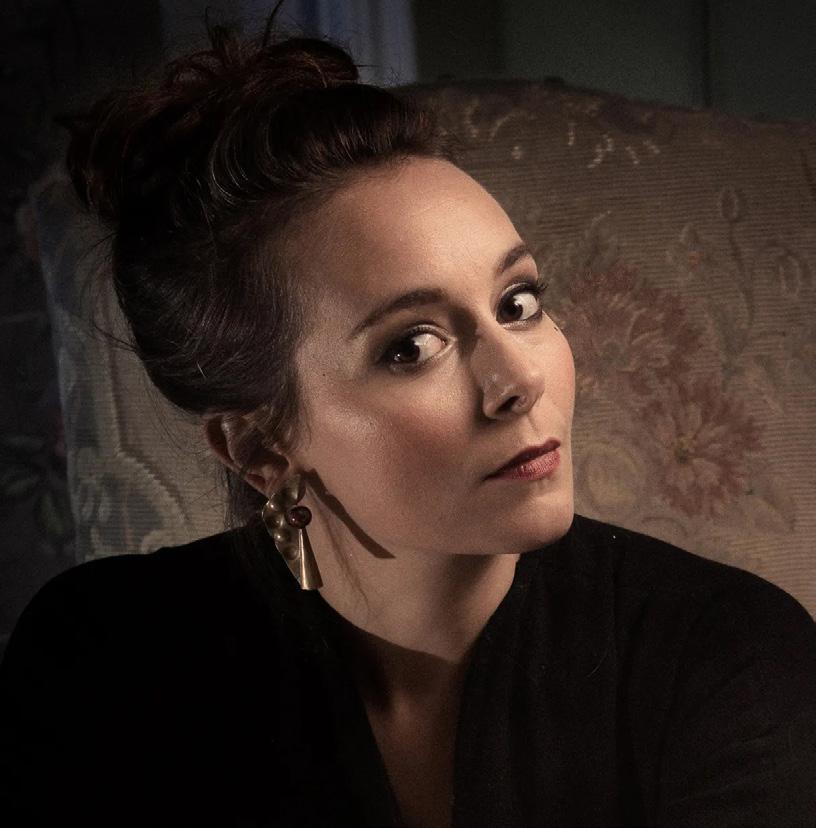
Anna Dennis studied at the Royal Academy of Music and was the recipient of the 2023 Royal Philharmonic Society’s Singer award.
Her opera performances include Katie Mitchell’s New Dark Age at the Royal Opera House, Purcell’s The Fairy Queen at Drottningholms Slottsteater in Stockholm, Handel’s Rodelinda at the Göttingen International Handel Festival, Mozart’s Idomeneo directed by Graham Vick at Birmingham Opera Company, Damon Albarn’s Dr Dee at English National Opera, and roles in all three Monteverdi operas during Sir John Eliot Gardiner’s world tour of the trilogy. She recently created the title role of Violet in Tom Coult’s debut opera, premiered at the Aldeburgh festival, and multiple roles in Sir David Pountney’s Purcell pasticcio Masque of Might for Opera North.
In concert she has sung with the Scottish Chamber Orchestra, BBC Symphony Orchestra, Orchestra of St Luke’s in New York, Australian Chamber Orchestra, Birmingham Contemporary
Music Group, Orquestra Gulbenkian, Les Violons du Roy, Britten Sinfonia, Akademie Alte Musik Berlin and Sinfonietta Riga. She has sung Britten’s War Requiem at the Berlin Philharmonie and Thomas Ades’ Life Story, accompanied by the composer, at New York’s White Light Festival. Recent highlights include performing Anthony Burgess’ setting of T S Eliot’s The Waste Land with Benedict Cumberbatch and Britten Sinfonia at the Charleston Festival, Bach’s Mein Herze schwimmt im Blut with Kristian Bezuidenhout in Riga, Haydn’s Jahreszeiten with the Düsseldorfer Symphoniker under Adam Fischer, and Handel’s Orlando with the Academy of Ancient Music under Laurence Cummings.
Anna’s numerous recordings include Elena Langer’s Landscape with Three People, the GRAMMY-nominated Kastalsky Requiem with the Orchestra of St Luke’s under Leonard Slatkin, two orchestral song cycles on composer Tom Coult’s debut disc Pieces that Disappear with the BBC Philharmonic Orchestra, and Handel’s Amadigi di Gaula with the Early Opera Company under Christian Curnyn.
In the current season she sings Queen of the Night in The Magic Flute for Opera North, Boulez’s Pli selon Pli with the BBC Symphony Orchestra and Martyn Brabbins, Thomas Ades’ America: A Prophecy with The Hallé, conducted by the composer, Pergolesi’s Stabat Mater with the Portland Baroque Orchestra, Mendelssohn’s Lobgesang with the Orquesta de la Comunidad de Madrid and Poulenc’s Gloria with the Scottish Chamber Orchestra.

FIRST PERFORMANCE 1991 DURATION 62 minutes
1. Vorspiel (Prelude)
2. Das Rheingold (The Rhine Gold)
3. Nibelheim (Nibelheim)
4. Walhall (Valhalla)
5. Die Walküren (The Valkyries)
6. Feuerzauber (Magic Fire)
7. Waldweben (Forest Murmurs)
8. Siegfrieds Heldentat (Siegfried’s Heroic Deed)
9. Brünnhildes Erwachen (Brünnhilde’s Awakening)
10. Siegfried und Brünnhilde (Siegfried and Brünnhilde)
11. Siegfrieds Rheinfahrt (Siegfried’s Rhine Journey)
12. Siegfrieds Tod (Siegfried’s Death)
13. Trauermusik (Funeral Music)
14. Brünnhildes Opfertat (Brünnhilde’s Sacrificial Act)
Performed by the RSNO
Gods and monsters, giants and dwarves, heroism, boundless love and an unending quest for power: Richard Wagner’s four-opera Ring cycle creates an entire world all its own, a vast Nordic and Germanic mythology in which it immerses its audience for no fewer than 15 hours (or thereabouts). No wonder it took the composer 28 years to compose, and required a brand-new venue – Wagner’s Bayreuth Festival Theatre, with its pioneering innovations in staging, lighting, pyrotechnics and more – to fully satisfy the operas’ epic demands.
Despite its complex plot and its immense cast of characters, in many ways Wagner’s Ring cycle is surprisingly straightforward. As Wagner wrote to his friend August Röckel in 1854, it’s about death, renewal and change:
We must learn to die in the most absolute sense of the word. The course of the drama shows the necessity of accepting and giving way to the changeability, the diversity, the multiplicity, the eternal newness of reality and of life.
And the agent of that fundamental change is, of course, the ring itself – an object of unspeakable power, forged from the sacred Rhine Gold by the scheming dwarf Alberich in the first of the four operas, Das Rheingold. But the almighty ring also wields a terrifying curse: it will be an object of overwhelming desire for those who do not possess it, but an object of fear and ultimate doom for those who do.
Wagner weaves his mythic story – derived from the Poetic Edda, a collection of ancient Norse poems, and the medieval Germanic Nibelunglied – through often intoxicatingly rich music, in which the raw ingredients of his tale play a fundamental role. They are musically
embodied as what were later termed Leitmotifs, short musical ideas representing characters, places, themes or ideas that are in a constant state of flux and cross-fertilisation as the story progresses. Wagner’s musical innovation of so inseparably intertwining his narrative and his music has been immensely influential, going on to impact everything from uncompromising Schoenbergian serialism to lush Hollywood film scores.
And it’s this fundamental linking of music and story that makes a purely orchestral version of Wagner’s Ring cycle such an attractive – and convincing – idea. Dutch percussionist and composer Henk de Vlieger created The Ring, An Orchestral Adventure in 1991, and it would be the first of four orchestral arrangements he made of Wagner operas. De Vlieger focuses on key episodes from the Ring’s four operas, but retains chronological and narrative order and –for the most part – Wagner’s original scoring, occasionally supplying an orchestral instrument to stand in for a vocal soloist. The result is almost an immense symphonic poem spread across four connected movements, each representing one of the cycle’s operas.
We begin with the Prelude to the first opera, Das Rheingold, depicting nothing less than the beginning of the world and the flow of the Rhine. After a vision of the river’s precious gold, protected by the Rhine Maidens, we shift to the hammering anvils of the dwarvish kingdom of Nibelheim, where the ring is being forged, and then to the god Wotan’s shimmering castle Valhalla, built by the giants Fasolt and Fafner, whom Wotan hopes to pay with the ring he has stolen from Alberich.
We move into the cycle’s second opera, Die Walküre, for what’s surely the Ring’s most iconic orchestral music. The ‘Ride of the Valkyries’ depicts the flying warrior women – including Wotan’s daughter Brünnhilde – who carry the fallen from the battlefield to everlasting light in Valhalla. The subsequent ‘Magic Fire’ music comes from the very end of Die Walküre, as Wotan punishes his disobedient daughter by
sending her to sleep within a ring of charmed flames, which only a true hero can cross.
We meet that hero in the cycle’s third opera, Siegfried, first at rest amid the sounds of birds, insects and trees in the forest. Having slain the giant Fafner (now in dragon form, and jealously guarding the ring), Siegfried is directed to seek out Brünnhilde. He crosses Wotan’s ring of magic fire and awakens our heroine with a kiss, marking the moment that the gods’ dominance over the world first begins to crack.
Wagner’s ecstatic portrayal of the love between Siegfried and Brünnhilde opens de Vlieger’s selection from the cycle’s final opera, Götterdämmerung, followed by Siegfried’s Rhine Journey to the Hall of the Gibichungs, where he will be murdered by evil dwarf Hagen, son of the wronged Alberich. His funeral music is fittingly grand and grief-stricken. In despair, Brünnhilde mounts Siegfried’s funeral pyre to join her lover in death, the Rhine overflows, Valhalla burns, and the gods are no more. Wagner ushers in a new age at the end of his vast tetralogy almost entirely without voices, and de Vlieger follows the earlier composer’s lead as The Ring, An Orchestral Adventure soars to a conclusion of visionary majesty.
© David Kettle
Listen again to the RSNO Wagner arr. de Vlieger The Ring, An Orchestral Adventure Plus Siegfried Idyll Neeme Järvi Conductor
More information rsno.org.uk/recordings
EDN Fri 6 Jun 7.30pm
GLW Sat 7 Jun 7.30pm

Shostakovich Festive Overture
Shostakovich Cello Concerto No2
Shostakovich Symphony No11 The Year 1905
Thomas Søndergård Conductor
Daniel Müller-Schott Cello

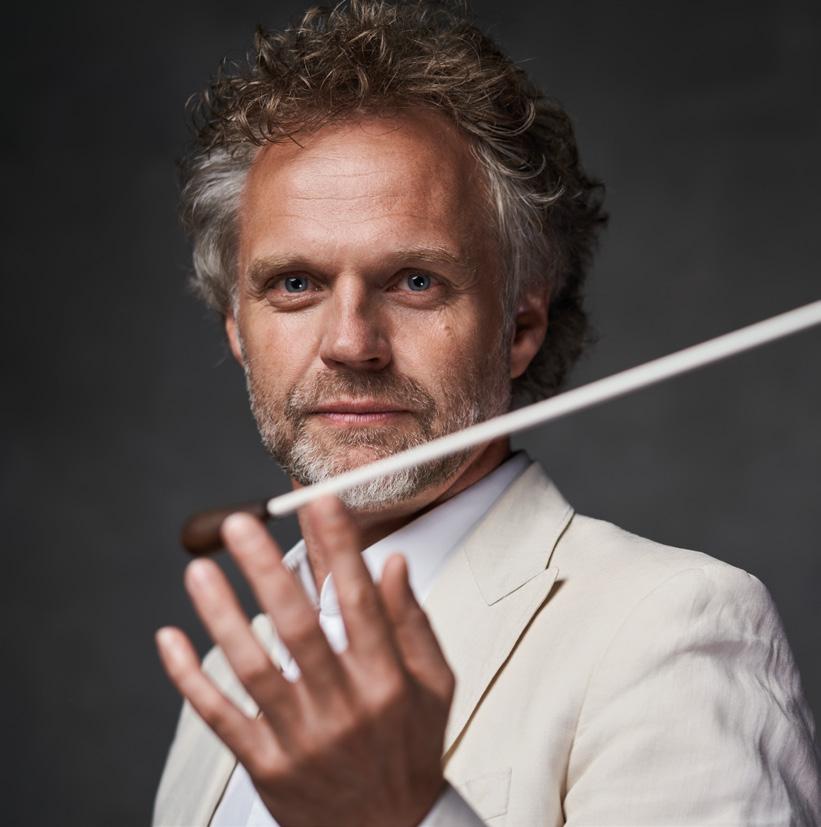
Danish conductor Thomas Søndergård has been Music Director of the RSNO since 2018, following six seasons as Principal Guest Conductor, and is Music Director of the Minnesota Orchestra. Between 2012 and 2018, he served as Principal Conductor of the BBC National Orchestra of Wales (BBC NOW), after stepping down as Principal Conductor and Musical Advisor of the Norwegian Radio Orchestra.
He has appeared with many notable orchestras in leading European centres, such as Berlin (Berliner Philharmoniker, RundfunkSinfonieorchester Berlin, Mahler Chamber Orchestra, Konzerthausorchester Berlin), Munich (Symphonieorchester des Bayerischen Rundfunk), Zurich (Tonhalle-Orchester Zürich), Leipzig (Gewandhausorchester), Paris (Orchestre National de France), London (London Philharmonic, BBC Symphony, London Symphony, Philharmonia Orchestra) and Amsterdam and Rotterdam (Royal Concertgebouw Orchestra, Netherlands Philharmonic, Rotterdam Philharmonic), and is a familiar figure in Scandinavia, with such orchestras as the Oslo Philharmonic, Gothenburg Symphony,
Danish National Symphony, Royal Stockholm Philharmonic, Swedish Radio Symphony, Finnish Radio Symphony and Helsinki Philharmonic. North American appearances to date have included the symphony orchestras of New York, Chicago, Cleveland, Cincinnati, Baltimore, St Louis, Toronto, Atlanta, Montreal, Vancouver, Houston and Seattle.
Following his acclaimed debut for Royal Danish Opera (Kafka’s Trial), he has since returned to conduct Die Walküre, Elektra, Le nozze di Figaro, Il barbiere di Siviglia, La bohème, Cunning Little Vixen and Il viaggio a Reims. He has also enjoyed successful collaborations with Norwegian Opera and Royal Swedish Opera. His Stockholm productions of Tosca and Turandot (both with Nina Stemme) led to his Bayerische Staatsoper debut, conducting main season and Opera Festival performances of Turandot with Stemme. He made his Deutsche Oper Berlin debut with the world premiere of Scartazzini’s Edward II and has since returned for Berlioz’s Romeo and Juliet.
His discography covers a broad range of repertoire, including Carl Nielsen (Royal Danish Orchestra, Naxos Records); Poul Ruders (Arhus Symphony, Norwegian Radio, Royal Danish Opera (Kafka’s Trial), Da Capo and Bridge Records); Sibelius symphonies and tone poems with BBC NOW and Prokofiev and Richard Strauss with the RSNO, Linn Records; Lutosławski and Dutilleux concertos with cellist Johannes Moser and Rundfunk Sinfonieorchester Berlin (Pentatone); and Vilde Frang’s celebrated debut recording (WDR Köln, EMI).
In 2023, Thomas was a recipient of the Carl Nielsen and Anne-Marie Carl Nielsen’s Foundation award for his outstanding contribution to Danish musical life. In 2022, he was decorated with a prestigious Royal Order of Chivalry, the Order of Dannebrog (Ridder af Dannebrogordenen), by Margrethe II, Queen of Denmark.

Formed in 1891 as the Scottish Orchestra, the company became the Scottish National Orchestra in 1950 and was awarded Royal Patronage in 1977. Many renowned conductors have contributed to its success, including Sir John Barbirolli, Walter Susskind, Sir Alexander Gibson, Neeme Järvi, Walter Weller, Alexander Lazarev and Stéphane Denève.
The Orchestra’s artistic team is led by Danish conductor Thomas Søndergård, who was appointed Music Director in 2018. In March 2024, Austrian-born conductor, composer and musician Patrick Hahn became the Orchestra’s Principal Guest Conductor.
The RSNO is supported by the Scottish Government and is one of the Scottish National Performing Companies. The Orchestra performs across Scotland, including concerts in Glasgow, Edinburgh, Dundee, Aberdeen, Perth and Inverness, and appears regularly at the Edinburgh International Festival and BBC Proms. The RSNO has made recent tours to the USA, China and Europe.
The RSNO has a worldwide reputation for the quality of its recordings, receiving a 2020 Gramophone Classical Music Award for Chopin’s
Piano Concertos (soloist: Benjamin Grosvenor), conducted by Elim Chan, two Diapason d’Or awards (Denève/Roussel 2007; Denève/Debussy 2012) and eight GRAMMY Award nominations. In recent years, the RSNO has increasingly recorded soundtracks for film, television and video games, with notable titles including Horizon: An American Saga (Warner Bros), Life on Our Planet (Netflix), Star Wars Outlaws (Ubisoft), Avatar: Frontiers of Pandora (Meta Quest VR) and The Woman King (Sony Pictures). The Orchestra records at its bespoke in-house facility, Scotland’s Studio, in Glasgow.
The RSNO believes that music can enrich lives, and aims to inspire, educate and entertain people throughout Scotland and beyond with its performances, recordings and engagement programmes. Supporting schools, families, young professionals and wider communities, the RSNO delivers high-quality initiatives for all ages and abilities, reaching over 68,000 people in 2023.
FIRST VIOLIN
Maya Iwabuchi
LEADER
Lena Zeliszewska
ASSOCIATE LEADER
Tamás Fejes
ASSISTANT LEADER
Patrick Curlett
Caroline Parry
Elizabeth Bamping
Lorna Rough
Susannah Lowdon
Alan Manson
Liam Lynch
Gillian Risi
Fiona Stephen
Nia Bevan
Helena Rose
Bríona Mannion
Emily Brise
SECOND VIOLIN
Lisa Obert
GUEST PRINCIPAL
Jacqueline Speirs
Marion Wilson
Nigel Mason
Paul Medd
Harriet Hunter
Anne Bünemann
Robin Wilson
Kirstin Drew
Colin McKee
Tom Greed
Shulah Oliver-Smith
Seona Glen
Joe Hodson
Julie Reynolds
Elspeth MacLeod
VIOLA
Tom Dunn
PRINCIPAL
Felix Tanner
Nicola McWhirter
Claire Dunn
Katherine Wren
Maria Trittinger
Francesca Hunt
Beth Woodford
Elaine Koene
Nicola Boag
Aoife Magee
Ian Budd
CELLO
Pei-Jee Ng PRINCIPAL
Betsy Taylor
Kennedy Leitch
Yuuki Bouterey-Ishido
Rachael Lee
Sarah Digger
Niamh Molloy
Gunda Baranauskaitė
Sonia Cromarty
Susan Dance
Miranda PhythianAdams
Emily Brockett
DOUBLE BASS
Nikita Naumov
PRINCIPAL
Simo Väisänen
Michael Rae
Moray Jones
Alexandre Cruz dos Santos
Cole Morrison
Joana Moura
Olaya Garcia Alvarez
FLUTE
Katherine Bryan
PRINCIPAL
Jack Welch
Siobhan Grealy
Janet Richardson
PRINCIPAL PICCOLO
OBOE
Rainer Gibbons
GUEST PRINCIPAL
Peter Dykes
Gaynor Gowman
Fraser Kelman
COR ANGLAIS
CLARINET
Timothy Orpen
PRINCIPAL
William Knight
PRINCIPAL E FLAT CLARINET
Robert Digney
Duncan Swindells
PRINCIPAL BASS CLARINET
BASSOON
David Hubbard
PRINCIPAL
Hugo Mak
Fraser Gordon
HORN
Benji Hartnell-Booth
GUEST PRINCIPAL
Alison Murray
Andrew McLean
David McClenaghan
Martin Murphy
WAGNER TUBA
Mark Bennett
WAGNER TUBA
Flora Bain
WAGNER TUBA
Finlay Bain
WAGNER TUBA
Max Howling
TRUMPET
Christopher Hart
PRINCIPAL
Katie Smith
Mark Addison
TROMBONE
Dávur Juul Magnussen
PRINCIPAL
Hannah Stell
Alan Adams
BASS TROMBONE
Alastair Sinclair
CONTRABASS TROMBONE
BASS TRUMPET
Huw Evans
TUBA
John Whitener
PRINCIPAL
TIMPANI
Paul Philbert
PRINCIPAL
Simon Archer
PERCUSSION
Simon Lowdon
PRINCIPAL
Alasdair Kelly
Peter Murch
HARP
Rosanna Rolton
Teresa Barros Pereira
Romão
Clara Gatti Comini
Gina Gallacher
OFF-STAGE HORN
Lauren Reeve-Rawlings

Dunedin Consort is one of the world’s leading Baroque ensembles, recognised for its vivid and insightful performances and recordings. Formed in 1995 and named after Din Eidyn, the ancient Celtic name for Edinburgh Castle, Dunedin Consort’s ambition is to allow listeners to hear early music afresh, and to couple an inquisitive approach to historical performance with a commitment to commissioning and performing new music. Under the direction of John Butt, the ensemble has earned two coveted Gramophone Awards, a BBC Music Magazine Award and a GRAMMY nomination. In 2021 it was the recipient of the Royal Philharmonic Society Ensemble Award.
Dunedin Consort performs regularly at major festivals and venues across the UK and abroad, and enjoys close associations with the BBC Proms, Wigmore Hall, Edinburgh International Festival and Lammermuir Festival. Alongside its performance and recording work, Dunedin Consort is committed to a wide-ranging education programme both in schools and in the wider community. In inspiring and encouraging
musical participation, developing vocal skills and fostering a love of classical music, historical performance and new music, Dunedin Consort aims to develop and nurture its potential audience and to encourage the performers of the future.
Dunedin Consort is an enthusiastic champion and commissioner of contemporary music, and in recent years has premiered a new set of orchestral dances at the BBC Proms, a new opera by Errollyn Wallen at the Barbican Centre, and new choral music for its a cappella consort. In 2025 it premiered a new cantata by David Fennessy, the second instalment of a three-year co-commissioning series which saw a guitar concerto by Cassandra Miller for Sean Shibe in 2024, and will see further new music by Tansy Davies in 2026.
SINGERS
SOPRANO
Anna Dennis
MEZZO-SOPRANO
Catherine Backhouse
TENOR
Magnus Walker
Malcolm Bennett
BASS
Jon Stainsby
LEADER AND DIRECTOR
Jane Gordon
Sarah Bevan-Baker
Hilary Michael
Kristin Deeken
Barbara Downie
Malú Pomares
VIOLA
John Crockatt
Thomas Kettle
CELLO
Lucia Capellaro
Samuel Ng
BASS
Kate Brooke
OBOE D’AMORE
Alexandra Bellamy
FLUTE
Katy Bircher
FLUTE AND RECORDER
László Rózsa
BASSOON
Catriona McDermid
Directors
Jenny Stewart
CHAIR
Mark Batho
Courtney Beck
Cathy Bell MBE
Susie Gray
Kate Molleson
Philip Rodney
Kalvir Sangha
Music Director
John Butt OBE FBA FRSE
Associate Director
Nicholas Mulroy
Dunedin Concerts Trust Ltd
Management
Andrew Trinick
CHIEF EXECUTIVE
Jennie Baillie
HEAD OF MARKETING AND COMMUNICATIONS
Lucia Capellaro
LEARNING AND PARTICIPATION MANAGER
Sanne Dijkstra-Downie
DEVELOPMENT MANAGER
Edward Edgcumbe
HEAD OF ARTISTIC PLANNING AND OPERATIONS
Amy Strachan
LEARNING AND PARTICIPATION MANAGER
Georgia Tawn
ARTISTIC PLANNING COORDINATOR
Registered Scottish Charity Number SC025336
Registered in Scotland Company Number SC361385
77 Montgomery Street, Edinburgh EH7 5HZ
Tel: +44 131 516 3718
Email: info@dunedin-consort.org.uk
W: dunedin-consort.org.uk


Facebook.com/Dunedin @dunedinconsort @dunedinconsortscot
Dunedin Consort acknowledges with grateful thanks the support of Creative Scotland, Dunard Fund,
Baillie Gifford, Binks Trust, John Ellerman Foundation and the Arts and Humanities Research Council, who very generously support our programmes.

Eden Court, Inverness 22 & 24 May
Festival Theatre Edinburgh 29 May – 7 June
His Majesty’s Theatre, Aberdeen 12 & 14 June
I am honoured and extremely proud to be Music Director of the RSNO. It is through the continued generosity of you, our friends, donors and supporters, that we can continue to achieve and realise the most ambitious goals of the Orchestra.
One of the wonders of the RSNO is how it brings high-quality music not only to concert halls, but to the wider community. From hospital settings to care homes, from our Astar app for families with newborns to our National Schools Concert Programme, our music touches so many lives in Scotland and beyond. Your support is the
RSNO Benefactors are beacons of philanthropic inspiration, providing truly transformative financial support to the Orchestra that enables us to build and deliver long-term strategic plans. Benefactors share the RSNO’s vision for orchestral music and work with us to drive
cornerstone of all that we do, as it allows us to continually build and develop.
Thank you for being part of this wonderful Orchestra’s journey, as we adapt and grow towards a bright future.

Thomas Søndergård MUSIC DIRECTOR, RSNO
the organisation forward, helping us to realise our future plans and ambitions.
Sir Ewan and Lady Brown
Gavin and Kate Gemmell
Kat Heathcote and Iain Macneil
Ms Chris Grace Hartness
The RSNO Conductors’ Circle is an inspirational group of individual supporters at the heart of the RSNO’s Individual Giving programme. Our members’ annual gifts enable us to realise the Orchestra’s most ambitious goals. Conductors’ Circle members support inspirational concert performances for our audiences alongside innovative education programmes in communities across Scotland, via our ground breaking initiative Music for Life.
The RSNO is very grateful for the continued support of its Conductors’ Circle:
Ardgowan Charitable Trust
Stina Bruce Jones
Ian and Evelyn Crombie
Kenneth and Julia Greig
Carol Grigor and the Trustees of Dunard Fund
Shirley Murray
David and Alix Stevenson
Rolf and Celia Thornqvist
Eric and Karen Young
We would also like to thank those generous donors who wish to remain anonymous.
RSNO Patrons support individual musicians and members of the artistic team as well as advocating our work off the stage, from Learning and Engagement activity to commissioning new music. Becoming a Patron will bring you closer to the communities we serve across Scotland and will help to ensure that we maintain our position as one of Europe’s leading symphony orchestras.
RSNO Patrons
Geoff and Mary Ball
George Ritchie
Stephen Sweeney
Valerie Wells
Learning and Engagement Patrons
William Brown, W.S
The Dundee RSNO Circle Committee
Members of the Glasgow RSNO Circle
Neil & Nicola Gordon
Professor Gillian Mead, FRSE
Maurice & Nicola Taylor Charitable Trust
Chair Patrons
Chair Patrons are connected directly to the musicians on stage and get to enjoy privileged behindthe-scenes access. Our musicians truly appreciate the support they receive from their Chair Patrons and the brilliant opportunities they bring to the Orchestra.
Assistant Conductor
Derrick Morgan
The Solti Foundation Chair
First Violin
Maya Iwabuchi LEADER Dunard Fund Chair
Tamás Fejes ASSISTANT LEADER
The Bill and Rosalind Gregson Chair
Ursula Heidecker Allen
The James and Iris Miller Chair
Elizabeth Bamping
The WL and Vera Heywood Chair
Alan Manson
The Hugh and Linda Bruce-Watt Chair
Liam Lynch
Mr Kyle Anderson Weir
Second Violin
Marion Wilson
ASSOCIATE PRINCIPAL
The Nigel & Margot Russell Chair
Sophie Lang
The Ian & Evelyn Crombie Chair
Emily Nenniger
Mr Jamie & Kyle Anderson Weir
Viola
Tom Dunn PRINCIPAL
The Cathy & Keith MacGillivray Chair
Lisa Rourke SUB PRINCIPAL
The Meta Ramsay Chair
Francesca Hunt
The Rolf and Celia Thornqvist Chair
Beth Woodford
Mr Jamie & Kyle Anderson Weir
Cello
Pei-Jee Ng PRINCIPAL
Mr Jamie & Kyle Anderson Weir
Betsy Taylor
ASSOCIATE PRINCIPAL
The Maxwell Armstrong Chair
Kennedy Leitch
ASSISTANT PRINCIPAL
The David and Anne Smith Chair
Rachael Lee
The Christine and Arthur Hamilton Chair
Double Bass
Nikita Naumov
PRINCIPAL
The Gregor Forbes John Clark Chair
Michael Rae
ASSISTANT PRINCIPAL
James Wood Bequest Fund Chair
Flute
Katherine Bryan PRINCIPAL
The David and Anne Smith Chair
Oboe
Adrian Wilson PRINCIPAL
The Hedley Wright Chair
Peter Dykes
ASSOCIATE PRINCIPAL
Witherby Publishing Group Charitable Trust Chair
Cor Anglais
Henry Clay PRINCIPAL
In memory of a dear friend, Fiona H
Clarinet
Timothy Orpen PRINCIPAL
The Shirley Murray Chair
William Knight
ASSOCIATE PRINCIPAL
The David and Anne Smith Chair
Horn PRINCIPAL
The Springbank Distillers Chair
Alison Murray
ASSISTANT PRINCIPAL
Mr & Mrs Pierre and Alison Girard
Martin Murphy
ASSISTANT PRINCIPAL
The Gordon Fraser Charitable Trust Chair
David McClenaghan
The J & A Mitchell Chair
Trumpet
Christopher Hart PRINCIPAL
Ms Chris Grace Hartness
Katie Smith SUB-PRINCIPAL
The Lady Fraser Chair
Trombone
Dávur Juul Magnussen PRINCIPAL
The Mitchell’s Glengyle Chair
Timpani
Paul Philbert PRINCIPAL
Ms Chris Grace Hartness
Percussion
With thanks to the Dot and Syd Taft Chair for their support of the RSNO Percussion Section.
Staff
Chiko Parkinson
COMMUNITY SINGING ASSISTANT
Supported by ScotRail
We would like to acknowledge the great support of the RSNO Chair Patron Programme by Mr Hedley G Wright.
We are also grateful to those who give but who wish to remain anonymous.
If you would like more information or would like to discuss how you can become an RSNO Patron, please contact Constance Fraser, Head of Development (Individuals and Partnerships), at constance.fraser@rsno.org.uk
We would like to thank all those who continue to generously support the RSNO’s Play Your Part Appeal.
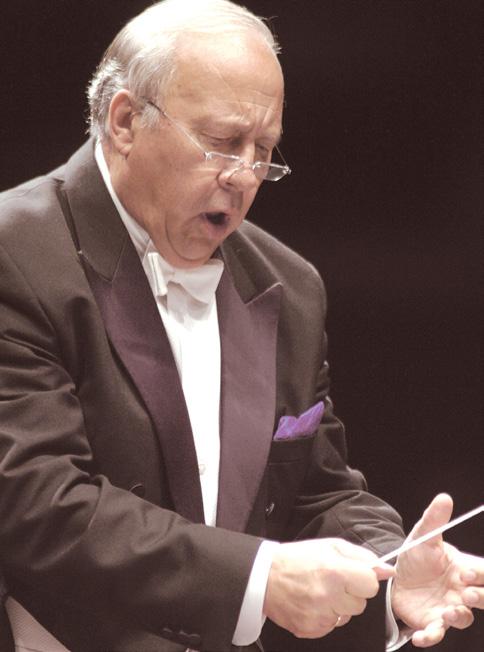



We all have special Musical Memories. It could be learning to play an instrument when you were a child, or a special piece of music that just left you breathless the first time you heard the Orchestra play it. Maybe it was seeing a soloist you had always wanted to hear, or just a great concert shared with friends. Memories such as these make music such an important part of our lives.
As a charity, our work relies on donations from our supporters and friends – whether performing world-class music on stage or engaging with children across Scotland in our National Schools Concert Programme – and we need your continued support.
By remembering the RSNO in your Will, you can help us share the joy of music with future generations and allow your passion for the Orchestra to live on.
It is easy to leave a gift. After you have made provisions for family and friends, please think of the Orchestra.

Your gift is important to us and to everyone in Scotland who enjoys music. Contact your solicitor to draft a will or add a codicil to your current will.
If your estate is subject to inheritance tax, a gift to a charity, such as the RSNO, is tax-free and will reduce the amount of tax payable to the Government. Please ask your solicitor for details.

For more information please visit rsno.org.uk/memories
If you would like to discuss this further, please contact Polly Lightbody, Individual Giving and Partnerships Officer, in the strictest confidence, at polly.lightbody@rsno.org.uk
To the many among you who have pledged to leave a gift already – thank you.





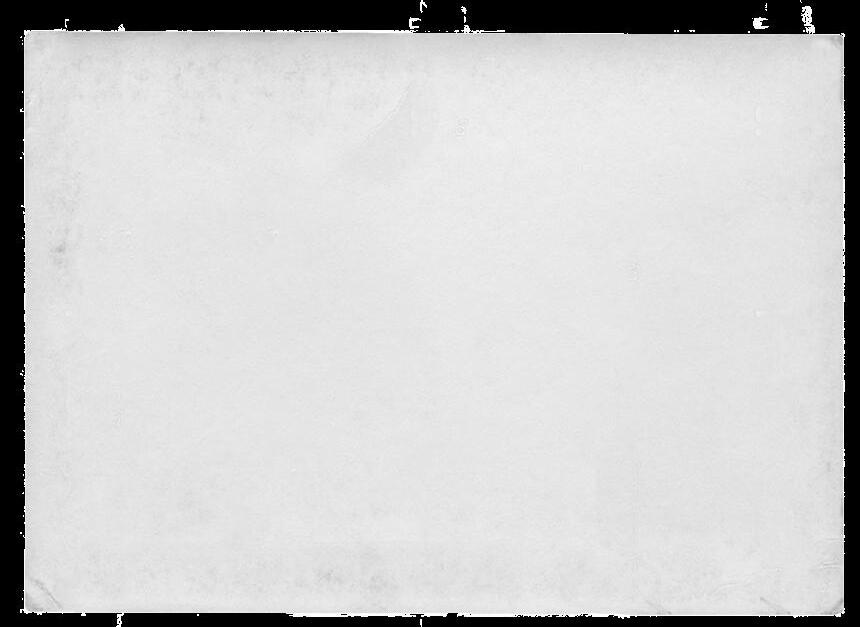



Charitable trusts and foundations have a distinguished history of supporting the RSNO, both on and off stage. From one-off donations for specific projects to multi-year funding for our flagship outreach initiatives, including the National Schools Concert Programme and Young Creatives, every grant in support of our work is truly appreciated. We are grateful to the following trusts and foundations for their generosity:
Aberdeen Endowments Trust
ABO Sirens Fund
Adam Mickiewicz Institute
Alexander Moncur Charitable Trust
Alma & Leslie Wolfson Charitable Trust
Balgay Children’s Society
The Boris Karloff Charitable Foundation
Boshier-Hinton Foundation
Brownlie Charitable Trust
The Castansa Trust
CMS Charitable Trust
The Common Humanity Arts Trust
Cookie Matheson Charitable Trust
Cruden Foundation
The David and June Gordon Memorial Trust
Dr Guthrie’s Association
The Dunclay Charitable Trust
The Educational Institute of Scotland
The Ettrick Charitable Trust
Fidelio Charitable Trust
Forteviot Charitable Trust
The Gaelic Language Promotion Trust
The Gannochy Trust
Garrick Charitable Trust
The Gordon Fraser Charitable Trust
Harbinson Charitable Trust
Hobart Charitable Trust
Hope Scott Trust
The Hugh Fraser Foundation
Idlewild Trust
James Wood Bequest Fund
Jean & Roger Miller’s Charitable Trust
Jennie S Gordon Memorial Foundation
Mrs J Y Nelson Charitable Trust
Miss Jean R Stirrat’s Charitable Trust
The Music Reprieval Trust
N Smith Charitable Settlement
Nancie Massey Charitable Trust
New Park Educational Trust
The Noël Coward Foundation
Northwood Charitable Trust
The Nugee Foundation
P F Charitable Trust
Pear Tree Fund for Music
The PRS Foundation
Pump House Trust
Q Charitable Trust
The R J Larg Family Trust
The Ronald Miller Foundation
The Rowena Alison Goffin Charitable Trust
The Scops Arts Trust
Scott-Davidson Charitable Trust
Scottish Enterprise
The Solti Foundation
Souter Charitable Trust
Stanley Morrison Trust
The Steel Charitable Trust
Stevenston Charitable Trust
Sylvia Aitken’s Charitable Trust
Tay Charitable Trust
Thomson Charitable Trust
Tillyloss Trust
Vaughan Williams Foundation
Verden Sykes Trust
W A Cargill Fund
W M Sword Charitable Trust

Jimmie Cairncross Charitable Trust

John Mather Charitable Trust
John Scott Trust Fund
JTH Charitable Trust
Leach Family Charitable Trust
Leng Charitable Trust
Lethendy Charitable Trust
Marchus Trust
Mary Janet King Fund (FS Small Grants)
McGlashan Charitable Trust
MEB Charitable Trust
The Meikle Foundation
Mickel Fund
Miss E C Hendry Charitable Trust
Walter Scott Giving Group
The Wavendon Foundation
The W M Mann Foundation
W M Sword Charitable Trust
The Zich Trust
We are also grateful to a number of trusts that wish to stay anonymous.
If you would like more information about our work and how you can make a difference, please contact Kirsten Reid, Head of Development (Trusts and Projects), at kirsten.reid@rsno.org.uk
Our Circle Members are at the centre of the RSNO. Your membership helps to support the future of the RSNO while sharing the joy of music both on and off stage.
When you join the RSNO Circle you enhance your relationship with the Orchestra and enjoy exclusive updates from our musicians. If you would like to find out more about joining the Circle, please visit rsno.org.uk/circle or get in touch with Polly Lightbody, Individual Giving and Partnerships Officer, at polly.lightbody@rsno.org.uk
Virtuoso
Ms Catherine Y Alexander
Mrs A M Bennett
Mr Alan and Mrs Carolyn Bonnyman
Dame Susan and Mr John Bruce
Stephen and Morny Carter
Francesca and Eoghan Contini Mackie
Dr Clive Criper
Martin and Carola Gordon
Scott and Frieda Grier
Judith and David Halkerston
Iain MacNeil and Kat Heathcote
Miss A McGrory
Miss M Michie
Mr James Miller CBE
Mrs Abigail Morrison
Nicholas and Alison Muntz
Meta Ramsay
Mr and Mrs W Semple
Mr Gregor Stewart
Mr Ian Taft
Claire and Mark Urquhart
Raymond and Brenda Williamson
Margaret Duffy and Peter Williamson
Symphony
William and Elizabeth Berry
Mr John Brownlie
Mr A Campbell
Dr K Chapman and Ms S Adam
Sir Sandy and Lady Crombie
Mr W G Geddes
Dr Robert Gibb
Mr I Gow
Mr J D Home
Christine Lessels
Katharine M.E. Liston
Professor J Mavor
Mrs A McQueen
Mr Iain Percival
Mr and Mrs David Robinson
Dr C Cradock and Dr S Todd
Neil Barton
Miss D Blackie
Dr C M Bronte-Stewart
Dr F L Brown
Mr and Mrs Burnside
David Caldwell
Ms H Calvert
Ross Cavanagh
Myk Cichla
Terry & Joan Cole
Dr J Coleiro
Mr and Mrs B H Cross
Christine and Jo Danbolt
Mr P Davidson
Steven J Davis
Mr C Ffoulkes
Mr and Mrs M Gilbert
Simon and Fiona Guest
Lord and Lady Hamilton
Mrs S Hawthorn
P Hayes
Dr and Mrs P Heywood
Ms H Kay
Mr and Mrs W Kean
Nicholas Kilpatrick
Christine Lessels
Morag MacCormick
Mr D MacPherson
Mr and Mrs Marwick
Mr S Marwick
Mrs Sandra Maxwell
Mr and Mrs G McAllister
Mrs M McDonald
Dr A H McKee
Mr Rod McLoughlin
Morag Millar
Mrs B Morinaud
Dr and Mrs D Mowle
Mr KR and Dr CC Parish
Ms A and Miss I Reeve
Mrs E.M. Robertson
Dr and Mrs G K Simpson
Mrs Henrietta Simpson
Norma & Duncan Smith
Mr and Mrs A Stewart
David and Helen Strachan
Mr G Stronach
Dr G R Sutherland
Mr I Szymanski
Mr and Mrs J B Watson
Mr and Mrs D Weetman
Roderick Wylie
Sonata
Mr K Allen
Jenny Beattie
Dr A D Beattie
Mrs H Benzie
Mr R Billingham
Lord and Lady Borthwick
John Bradshaw and Shiona Mackie
Mrs Bryan
Andrew Burrows
Mrs C M Campbell
Miss S M Carlyon
Amanda Carter-Fraser
Lady Coulsfield
Adam and Lesley Cumming
Mr and Mrs K B Dietz
Mrs C Donald
J Donald and L Knifton
Mr John Duffy
Mr R M Duncan
Brigadier and Mrs C C Dunphie

Mrs E Egan
Mr R Ellis
Mr R B Erskine
Dr E Evans
Dr A Ewing
David Ferrier
Kenneth Forbes
Mr D Fraser
Ms J Gardner
Philip & Karen Gaskell
Mrs M Gibson
Mrs M Gillan
Mrs JK Gowans
Dr J and Mrs H Graham
Professor and Mrs A R Grieve
Dr P J Harper
Dr N Harrison
Mr and Mrs R J Hart
Bobby and Rhona Hogg
Mr and Mrs F Howell
Mrs A Hunter
Inez Hutchison
Professor R N Ibbett
Thomas Jakobsen Burns
Ms K Lang
Dr D A Lunt
Mr and Mrs J Martin
Mrs Jean C Martin
Ms S McArthur
Jean McCutcheon
Mr M McGarvie
Mrs S McGeachan
Hon Lord McGhie
Dr Colin McHardy
Ms H L McLaren
Margaret McLay

Libby McLean
Mr D McNaughton
Mr and Mrs B Mellon
Kathryn Michael
Mr I Mills
Mrs P Molyneaux
Kenneth M. Murray
Bruce and Christine Nelson
Mr and Mrs K O’Hare
Mr and Mrs K Osborne
Dr G Osbourne
Mr A Ownsworth
Mr R Parry
John Paterson
Misses J and M Penman
Mr J W Pottinger
Miss J A Raiker
Mr M Rattray
Alastair Reid
Ms F Reith
Dr and Mrs D Robb
Mrs A Robertson
Anne Robertson
Ms A Robson
Sheriff Linda Ruxton
Mrs J Shanks
Mr J A Shipley
Dr M J and Mrs J A Shirreffs
Richard and Gillian Shirreffs
Mrs E Smith
Mr M Smith
Dr and Mrs B Stack
Mrs Lorna Statham
Mrs R F Stewart
Rev N and Mr R Stewart
Mr I Strachan
Mr and Mrs B Tait
Dr and Mrs T Thomson
Mr C Turnbull
Dr Morag Ward
Nelson and Barbara Waters
Mr W Watters
Alan Weddell
Philip Whitely and Robert H Mackay
Mr R Young
Thank you to all our members of the Circle, including Overture members and those who wish to remain anonymous.
FUNDERS
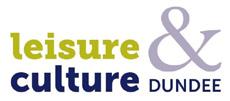



CORPORATE SUPPORTERS



PRINCIPAL MEDIA PARTNER
PRINCIPAL TRANSPORT PARTNER

CHARITY PARTNER

BROADCAST PARTNER

PARTNERS
Glasgow Chamber of Commerce • Institute of Directors • Scots Magazine The Scottish Council for Development & Industry • Smart Graphics
PROJECT PARTNERS
Alzheimer Scotland • Black Lives in Music • Children’s Hospice Association • Children’s Classic Concerts • Classic FM • Douglas Academy Dunedin Consort • Education Scotland • Gig Buddies • Goethe-Institut Glasgow • Hebrides Ensemble • Luminate Music Education Partner Group • ParentZone • Royal Conservatoire of Scotland • Scottish Book Trust • Scottish Refugee Council
Sistema Scotland • St Mary’s Music School • Starcatchers • Tayside Healthcare Arts Trust • The Scottish Wildlife Trust University of Edinburgh • V&A Dundee • Visible Fictions
CHAIR SPONSORS

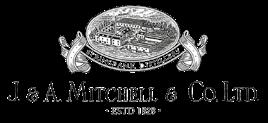
If you would like more information about sponsorships, corporate partnerships or fundraising events with the RSNO, please contact Constance Fraser, Head of Development (Individuals and Partnerships), at constance.fraser@rsno.org.uk
PATRON
His Majesty The King
RSNO BOARD OF DIRECTORS
Elected Directors
Gregor Stewart CHAIR
Gail Blain
HONORARY TREASURER
Ruth Binks
Kayla-Megan Burns
CHIEF EXECUTIVE
Alistair Mackie
Charlotte Jennings
EXECUTIVE ASSISTANT (MATERNITY LEAVE COVER)
Nicola Kelman
EXECUTIVE ASSISTANT (MATERNITY LEAVE)
CONCERTS
Graham Bell
PLANNING OFFICER
Megan Bousfield
LIBRARY ASSISTANT
Dylan Findlay
ASSISTANT STAGE MANAGER
Ashley Holland
STAGE MANAGER
Emma Hunter
DEPUTY ORCHESTRA MANAGER
Ewen McKay
HEAD OF ORCHESTRA MANAGEMENT
Richard Payne
LIBRARIAN
Tammo Schuelke
HEAD OF PLANNING
Craig Swindells
HEAD OF PRODUCTION
Matthias Van Der Swaagh
ASSISTANT ORCHESTRA MANAGER
Xander van Vliet
PLANNING MANAGER
Christine Walker
CHORUS MANAGER
LEARNING AND ENGAGEMENT
Andrew Stevenson
DIRECTOR OF ENGAGEMENT
Anna Crawford
ENGAGEMENT DELIVERY MANAGER
Ken Hay
Kat Heathcote
Don Macleod
David Robinson
John Stewart
David Strachan
Cllr Edward Thornley
NOMINATED DIRECTOR
Julia Miller
COMPANY SECRETARY
Player Directors
Katherine Bryan
Christopher Hart
David Hubbard
Sophie Lang
David McClenaghan
Lorna Rough
RSNO COUNCIL
Baroness Ramsay of Cartvale CHAIR
Ms Ruth Wishart
Rosie Kenneally
CREATIVE PRODUCER FOR LEARNING (MATERNITY LEAVE)
Maisie Leddy
ENGAGEMENT PRODUCER
Lois McColl
ENGAGEMENT PROJECT ASSISTANT
Rachel Naismith
ENGAGEMENT PRODUCER
Chiko Parkinson
COMMUNITY SINGING ASSISTANT SUPPORTED BY SCOTRAIL
Dr Jane Donald
DIRECTOR OF EXTERNAL RELATIONS
Lisa Ballantyne
PARTNERSHIPS OFFICER
Ian Brooke
PROGRAMMES EDITOR
Fred Bruce
TRUSTS AND PROJECTS ADMINISTRATOR
Clara Cowen
MARKETING MANAGER
Seonaid Eadie
EXTERNAL RELATIONS OFFICER
Carol Fleming
HEAD OF MARKETING
Constance Fraser
HEAD OF DEVELOPMENT (INDIVIDUALS AND PARTNERSHIPS)
Katie Kean
COMMUNICATIONS AND MARKETING OFFICER
Niamh Kelly
TRUSTS AND PROJECTS COORDINATOR
Polly Lightbody
INDIVIDUAL GIVING AND PARTNERSHIPS OFFICER
Graham Ramage
GRAPHICS DESIGNER
Kirsten Reid
HEAD OF DEVELOPMENT (TRUSTS AND PROJECTS)


YOUTH ASSEMBLY
George Hillier
Amy McColl
Hazel Sharp
Ailsa Smith
Jessica Smith
Penny Snell
Rachel Sunter
Ailsa Thompson
Danny Urquhart
Sam Stone
INFORMATION SERVICES MANAGER
Ross Williamson
VIDEO PRODUCER (MARKETING)
FINANCE AND CORPORATE SERVICES
Angela Moreland
CHIEF OPERATING OFFICER
Keilidh Bradley
GRADUATE ANIMATOR
Phoebe Connolly
FINANCE ASSISTANT
Abby Dennison
FINANCE ADMINISTRATOR
Ted Howie
FACILITIES COORDINATOR
Lorimer Macandrew
VIDEO PRODUCER
Sam McErlean
ASSISTANT SOUND ENGINEER
Calum Mitchell
ASSISTANT VIDEO PRODUCER
Hedd Morfett-Jones
DIGITAL MANAGER
Susan Rennie
HEAD OF FINANCE
Gabriel Smith
SOUND ENGINEERING PLACEMENT
Jade Wilson
FINANCE ASSISTANT
Royal Scottish National Orchestra 19 Killermont Street
Glasgow G2 3NX
T: +44 (0)141 226 3868 W: rsno.org.uk
Scottish Company No. 27809
Scottish Charity No. SC010702

Weekdays from 06:30am
